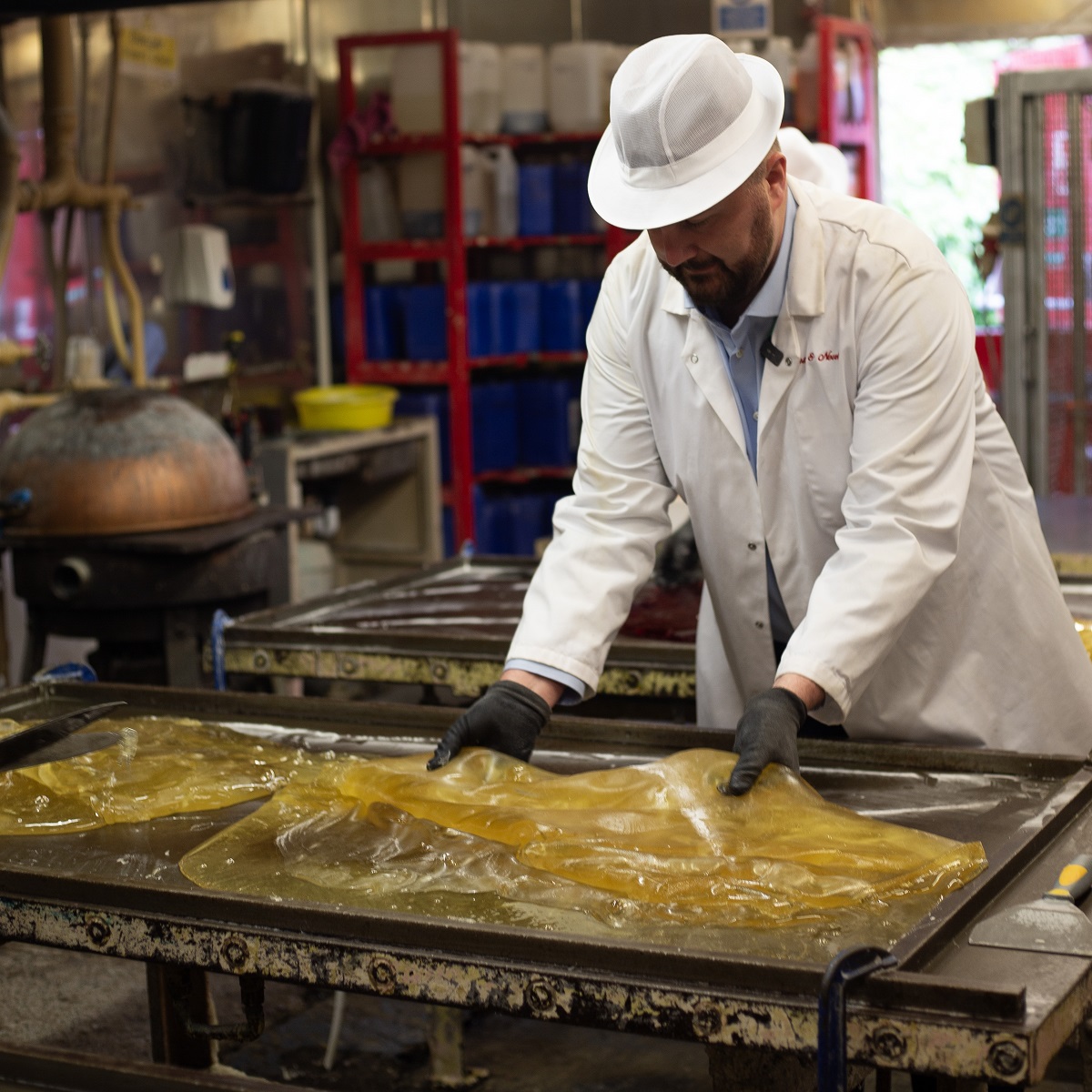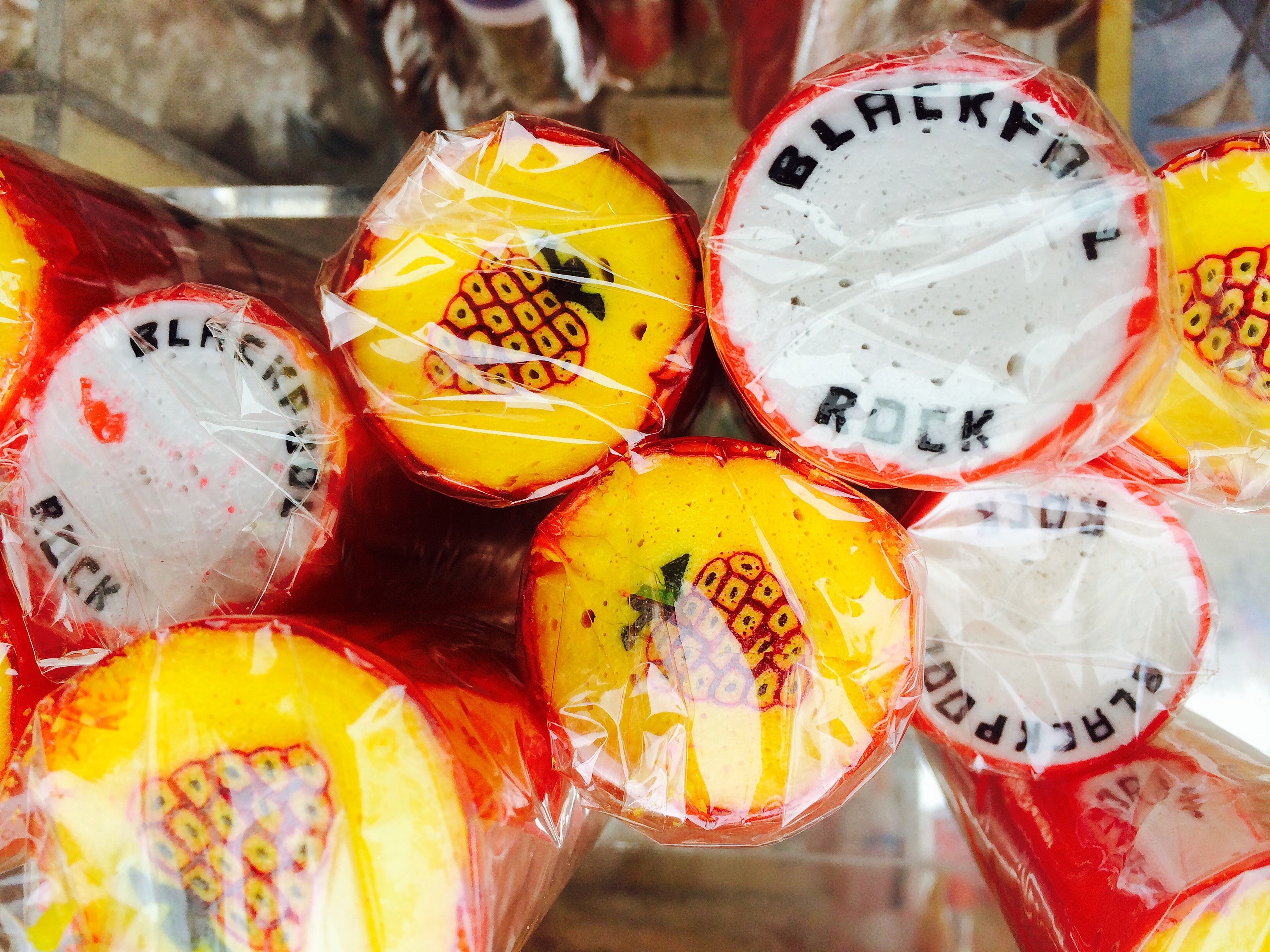Chris Webb joins production line to support campaign to save Blackpool Rock
Webb joined Stanton and Novelty, a third generation rock manufacturer in Blackpool South, to see the skill that goes into production
Chris Webb, the new MP for Blackpool South, has tried his hand at making Blackpool Rock as he continues his campaign with The Blackpool Lead to save it.
Webb, who will revert to being a candidate for Blackpool South today when parliament dissolves, raised his concerns about the future of Blackpool Rock in the House of Commons during his first few days in office after local confectioners raised the alarm about the threat they are under from cheap imitation imports, mainly from China.
On 28th May the MP joined Stanton and Novelty, a third generation rock manufacturer in Blackpool South, to see first hand the great skill that goes into making traditional Blackpool Rock and join the production line in making it.
Thorp explained the lettering process as Carl, an employee hand stretched and stacked strips of white and red toffee into long blocks that would go on to form letters.
“The key to lettering is the letter C,” he told Webb. “If you can make a C you can make a U, you can make an N, a W, an M and an E.”
Webb had helped tip the boiling toffee onto a hot plate before stretching and aerating it and passing it down the production line to Carl.
“You have to think of letters as being 3D and about three-feet long,” said Thorp. “So you’re not just writing the letter itself, you’re doing everything around it. You’re putting in what would be the white on a piece of paper if you wrote it out.
“Then you have to make sure you put the letters in the right order. It’s really easy to get it wrong and then you have to start all over again.”
Carl is one of three people at Stanton and Novelty who know how to letter rock, along with Thorp and his dad who is semi-retired. The three of them represent 10% of people in the entire country who practice this skill.
“There are only about 30 people in the UK still doing it and there’s about 50 who know how,” Thorp explained to Webb. “We’ve got three of the 30 here and the rest of them are in Blackpool, so it’s definitely a dying trade and one worth saving.”
Webb and The Blackpool Lead are co-hosting a petition which calls on the government to grant Blackpool Rock the same protected status as other cherished British staples such as Wensleydale Cheese, the Cornish Pasty and the Cumberland Sausage.
Webb has pledged to take the petition to Westminster following the general election on 4th July.
When he raised the issue in the House of Commons, Webb pointed out that only seven factories remain in Blackpool and this year some of them are facing up to a 40% drop in sales.
Webb’s call for a debate in government time to secure the future of Blackpool Rock was met with cross party support and Leader of The House, Penny Mordaunt, thanked him for raising this “very important issue”, adding that Blackpool Rock is “iconic”.
In their joint petition Webb and The Blackpool Lead are calling to protect Blackpool Rock under the geographical indication protected food names scheme. Thorp, whose grandfather founded the company in 1969, has also endorsed the petition.
He believes the ‘Stick of Rock’ should be protected under the scheme. This would guarantee the product’s characteristics, reputation, authenticity and origin. It would also protect the product name from misuse or imitation.

Chris Webb joined Stanton and Novelty, a third generation rock manufacturer in Blackpool South
Webb is also in talks with Heritage Crafts – the national charity set up to celebrate, support and safeguard traditional craft skills. The charity is set to review its ‘Red List’ of endangered crafts in the autumn, something Webb hopes to see traditional rock included on.
Thorp showed Webb a stick of imported rock next one one made a Stanton and Novelty, pointing out the difference in packaging – imported rock is shrink wrapped rather than hand wrapped and twisted at either end – and the difference in colour. The imported rock was yellow in appearance on the inside, as opposed to pure white. Thorp explained that the aeration process he had helped with is what makes the rock whiter. The imported rock that is seemingly not aerated is harder as a result and potentially more damaging to teeth.
Further along the production line Webb chatted to Doreen who rolled the rock into perfect cylinders by hand as it was pulled through a machine. The three-foot letters that Carl created now appearing on a minute scale inside long lengths of rock.
“I’ve been doing this for 50 odd years, on and off,” said Doreen. “I worked for David’s grandad who was brilliant. When I started I was expecting my first daughter and she’s 46 now.
“I should have retired but I came back because I can’t stay at home. It’s the thing that’s keeping me fit.
“Years ago there were a lot more factories,” Doreen added. “It’s sad there are so few now and nobody’s learning the trade. We need to keep it going.”
Doreen cut the rock into lengths before passing it to Wendy who wrapped it by hand at rapid speed. Around 15,000 sticks of rock are wrapped by hand every day at Stanton and Novelty, which operates seven days a week. Wendy estimates she’s wrapped about four million in her working life.
“I think British people have a cultural affinity to Blackpool Rock,” Thorp told Webb. “There’s an expectation that if you go to the seaside you’ll buy a stick of rock that’s made in the UK. 99% of it is going to be made in Blackpool and that’s why it’s so important that we protect it. It’s part of our shared cultural heritage.
Webb said: “It’s been great to get stuck in on the production line with the brilliant, skilled employees at Stanton and Novelty. It was very exciting for me to get the insight into production as a Blackpool lad who’s grown up with rock as a symbol of our seaside identity. I’ve seen the process first hand but I still think it’s actual magic how they get the lettering inside.
“We need as many people as possible to sign the petition to save Blackpool Rock and put pressure on whoever’s in government after this general election to make sure we save that special heritage that largely exists in Blackpool.
“These cheap imitations are jeopardising the livelihoods of Carl, Doreen, Wendy and the other hardworking employees who I’ve met today and across the town. It’s vital that we protect their jobs and this important piece of Blackpool culture.”
The Blackpool Lead is now on Substack.
Become a Member, and get our most groundbreaking content first. Become a Founder, and join the newsroom’s internal conversation - meet the writers, the editors and more.





